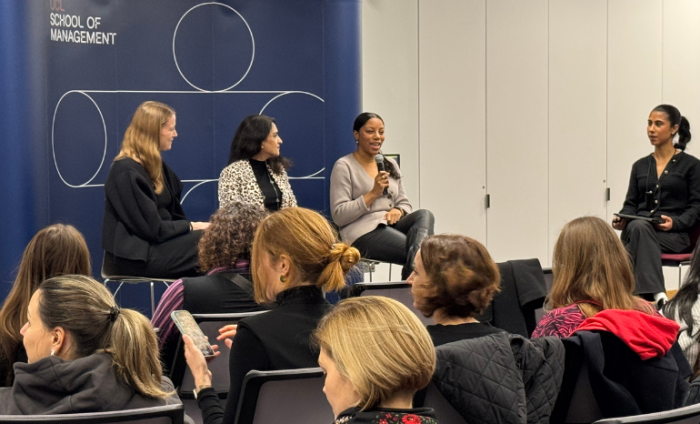
The UCL School of Management proudly hosted this year’s ElevateHer event in celebration of Women’s Entrepreneurship Day on 15 November 2024. Themed “Women’s Impact on Disruptive Technologies, Economic Freedom, and Entrepreneurial Opportunities for Women,” the event took place in Canary Wharf, and brought together students, entrepreneurs, and advocates for gender equality in the entrepreneurial ecosystem.
The panel included Yasmin Greenaway, founder of Derm AI and UCL MSc Entrepreneurship alumna; Joan Medland, co-founder of Shoal, who discussed building ventures that drive sustainability; and Professor Harveen Chugh, Director of the UCL MBA and Co-Founder of The Network for Coaching and Mentoring Entrepreneurs (NCME). The conversation was moderated by Jaya Bhardwaj, an MSc Entrepreneurship student and experienced professional in Canadian tech unicorns.
The discussed presented the following key insights:
1. Funding & Investment Landscape
Since research shows women entrepreneurs face differential treatment in pitch rooms (receiving preventative rather than advancement-focused questions), specific funding strategies become important. The panel recommended a stepped approach: first securing non-dilutive funding (such as Google Black Founders Fund, KPMG Black Entrepreneurs Award - £25K, to name a few), before pursuing venture capital. Since early-stage ventures are particularly vulnerable, they advised maintaining employment while building commercial validation. This approach allows entrepreneurs to build confidence and demonstrate market traction, strengthening their position when negotiating with investors.
2. Networks, Mentorship & Support Systems
Given that business success relies heavily on support, the panel emphasised the importance of authentic relationship-building. One founder described how her most valuable mentoring relationships emerged from voluntary work done a decade ago, demonstrating that genuine engagement in activities beyond business often yields the most valuable long-term connections. Rather than strategically targeting potential mentors, they advocated being naturally service-oriented and delivering value to others, as these authentic connections organically develop into meaningful support over time. It was also recommended to have both male and female mentors to gain knowledge from both perspectives, as well as raise awareness of issues faced.
3. Gender Bias & Expectations
As the technology and finance sectors remain male-dominated, women entrepreneurs must simultaneously manage both business development and gender-specific challenges. This dual challenge manifests in specific ways - for instance, when leadership assumptions default to male co-founders. The panel emphasised that addressing these biases requires being direct about misalignments, such as one founder who tracked and addressed the disproportionate attention given to her male co-founder in board meetings.
4. Leadership & Work-Life Integration
Since maintaining business control is important, the panel emphasised establishing clear boundaries with investors while being transparent about personal obligations. Because early hiring mistakes can be devastating, they stressed implementing protective measures like one-year vesting cliffs as essential safeguards, not optional extras. They cautioned against bringing in industry experts too soon, as their established ways of working can conflict with the adaptability needed in startups. Instead, early-stage ventures benefit from team members who can evolve with the company’s changing needs. The panel also emphasised the importance of choosing life partners carefully, noting that long-term entrepreneurial success requires substantial support at home. They discussed how partners need to be willing to take turns focusing on their careers and support each other through the intense demands of building a business.
5. Inspiration & Vision for the Future
While industry statistics about women entrepreneurs’ funding rates could be discouraging, the panel found that focusing on vision and storytelling rather than “defensive” metric presentation leads to better outcomes. When entrepreneurs maintain focus on their purpose - whether in sustainable finance or healthcare innovation - it also provides the resilience needed for long-term success. Therefore, acknowledging current challenges while focusing on value creation is key.
Commenting on the event, Pierre-Jean Hanard, School Lead for Entrepreneurship at the UCL School of Management, remarked: “The UCL ElevateHer event not only celebrated the resilience and achievements of women entrepreneurs but also provided practical strategies for overcoming challenges. These discussions underscored the importance of creating inclusive ecosystems that empower women to lead with confidence and achieve lasting impact”.
This event reflects the UCL School of Management’s commitment to promoting diversity and creating opportunities for underrepresented groups in entrepreneurship. By showcasing the accomplishments of women in innovation and exploring pathways to overcome systemic challenges, ElevateHer continues to inspire the next generation of leaders in technology and business.